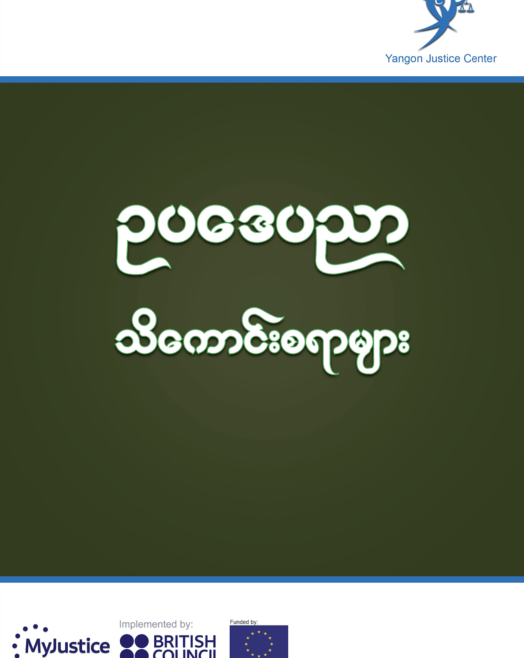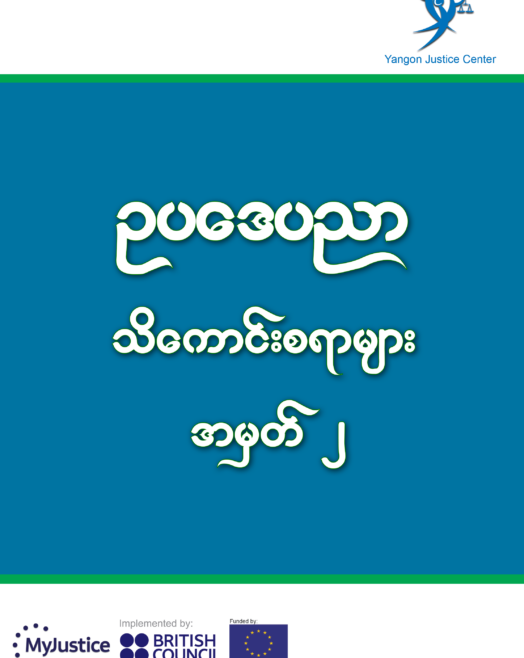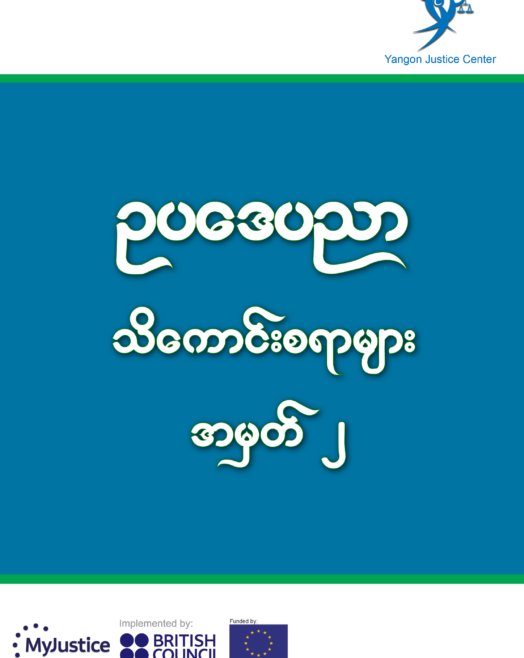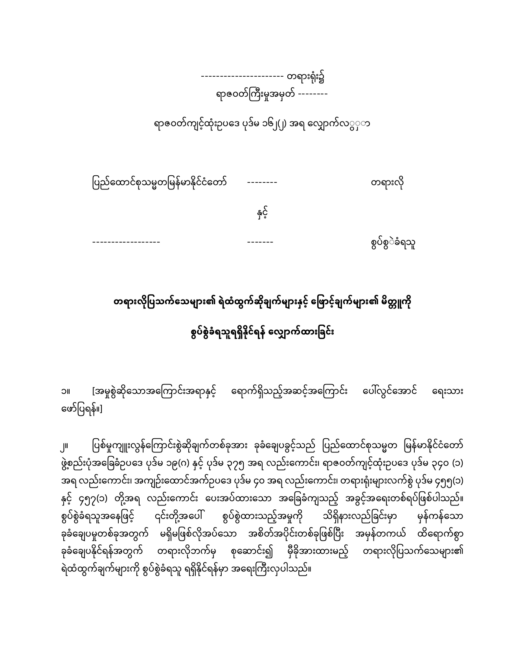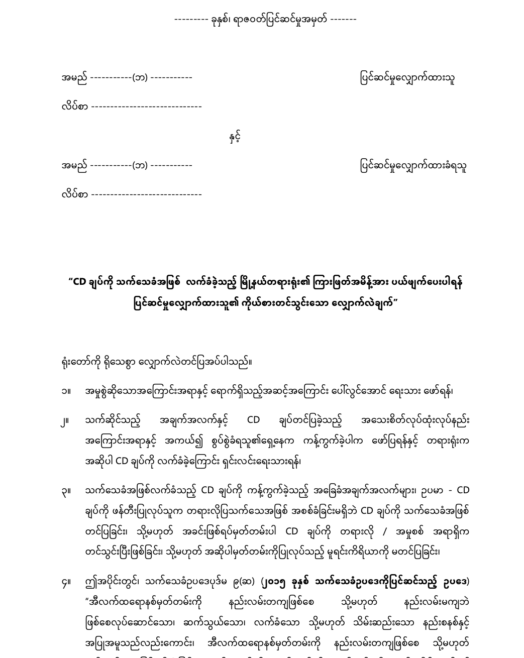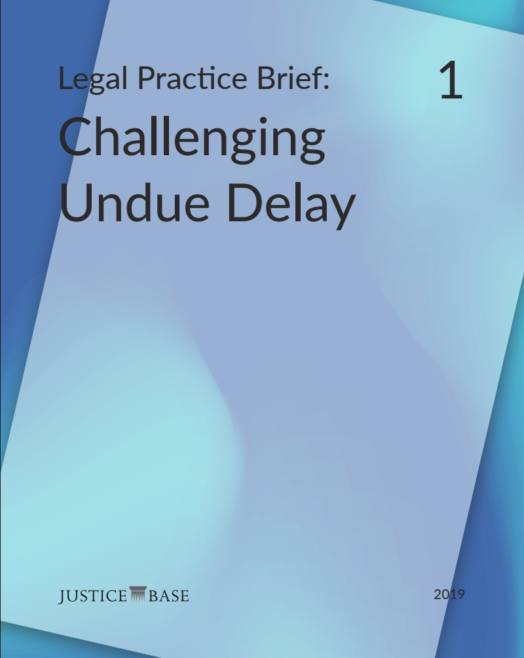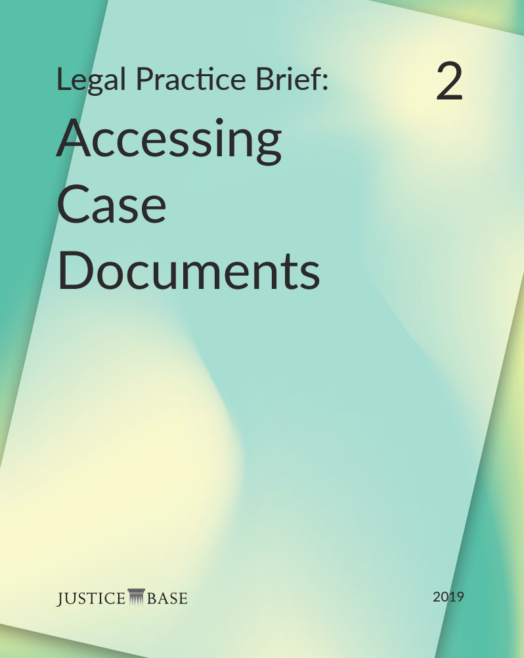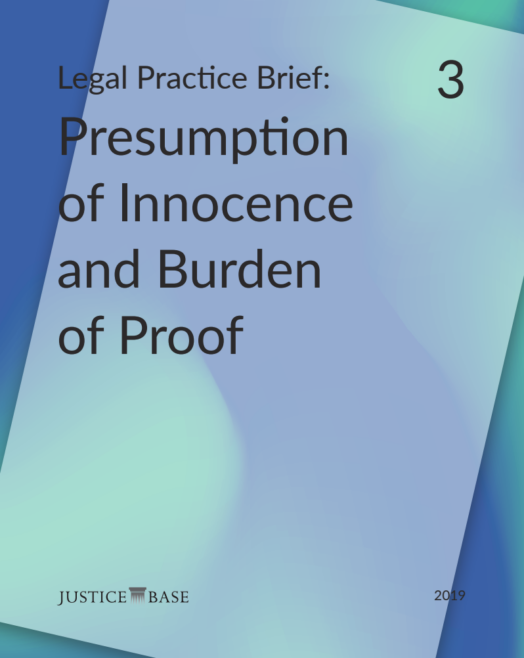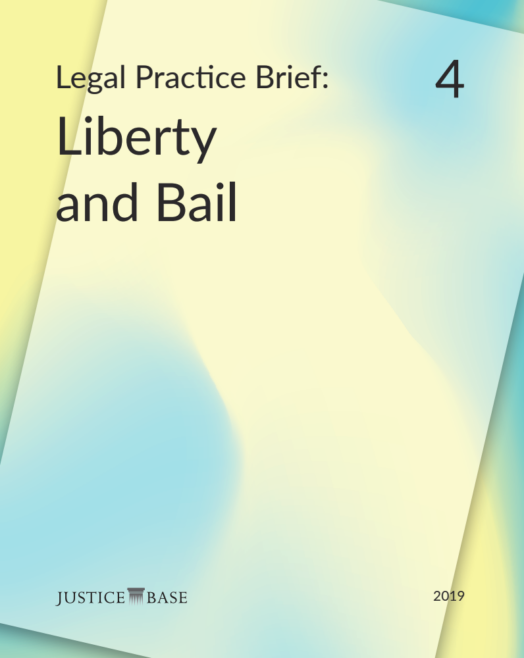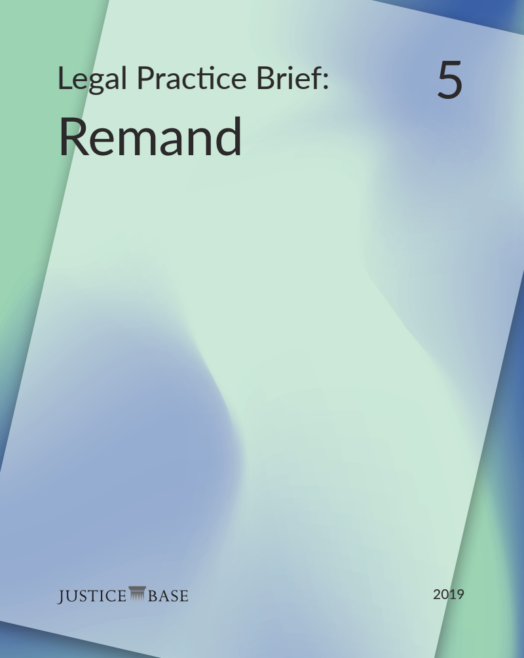လောင်းကစားဥပဒေ
Yangon Justice Center
သၞာံ: 2020
အရေဝ်ဘာသာ: Burmese
ဂကူတမ်ရိုဟ်: Research Report
မုက်လိက်: 14
ဂကောံ: Yangon Justice Center
ဂကောံပံၚ်တောဲ:
တၠဒါန်သပေါန်သာ: MyJustice
သက်သေခံပစ္စည်းစီမံခန့်ခွဲခြင်းနှင့် သက်သေစရိတ်
Yangon Justice Center
သၞာံ: 2022
အရေဝ်ဘာသာ: Burmese
ဂကူတမ်ရိုဟ်: Research Report
မုက်လိက်: 8
ဂကောံ: Yangon Justice Center
ဂကောံပံၚ်တောဲ:
တၠဒါန်သပေါန်သာ: MyJustice
သက်သေပြရန် တာဝန်
Yangon Justice Center
သၞာံ: 2022
အရေဝ်ဘာသာ: Burmese
ဂကူတမ်ရိုဟ်: Research Report
မုက်လိက်: 10
ဂကောံ: Yangon Justice Center
ဂကောံပံၚ်တောဲ:
တၠဒါန်သပေါန်သာ: MyJustice
သက်သေများ၏ ရဲထံထွက်ဆိုချက်များကို စွပ်စွဲခံရသူအား ပေးအပ်ရန် တောင်းခံသော လျှောက်ထားလွှာ
International Legal Foundation
သၞာံ: 2023
အရေဝ်ဘာသာ: English and Burmese
ဂကူတမ်ရိုဟ်: Practice Manual (How to…)
မုက်လိက်: 2
ဂကောံ: International Legal Foundation
ဂကောံပံၚ်တောဲ:
တၠဒါန်သပေါန်သာ: MyJustice
သက်သေအမျိုးအစားများအကြောင်း သိကောင်းစရာ
Yangon Justice Center
သၞာံ: 2022
အရေဝ်ဘာသာ: Burmese
ဂကူတမ်ရိုဟ်: Research Report
မုက်လိက်: 8
ဂကောံ: Yangon Justice Center
ဂကောံပံၚ်တောဲ:
တၠဒါန်သပေါန်သာ: MyJustice
အယူခံ/ပြင်ဆင်မှုများ အကြောင်း
Yangon Justice Center
သၞာံ: 2020
အရေဝ်ဘာသာ: Burmese
ဂကူတမ်ရိုဟ်: Research Report
မုက်လိက်: 34
ဂကောံ: Yangon Justice Center
ဂကောံပံၚ်တောဲ:
တၠဒါန်သပေါန်သာ: MyJustice
အီလက်ထရောနစ် သက်သေခံချက်အဖြစ် စီဒီအား မြို့နယ်တရားရုံးတော်မှ လက်ခံလိုက်သော ကြားဖြတ်အမိန့်အပေါ် ပြင်ဆင်မှုတင်သွင်းခြင်း
International Legal Foundation
သၞာံ: 2023
အရေဝ်ဘာသာ: English and Burmese
ဂကူတမ်ရိုဟ်: Practice Manual (How to…)
မုက်လိက်: 2
ဂကောံ: International Legal Foundation
ဂကောံပံၚ်တောဲ:
တၠဒါန်သပေါန်သာ: MyJustice
ဥပဒေနှင့်ညီသော ရှေ့နေလိုက်ပါ ဆောင်ရွက်မှုဆိုင်ရာ စာတမ်းငယ် – ၁ မလျော်ကန်သောကြန့်ကြာနေမှုများကို စိန်ခေါ်ရင်ဆိုင်ခြင်း
Kari Rotkin & Susan Lee
ဥပဒေနှင့်ညီသော ရှေ့နေလိုက်ပါ ဆောင်ရွက်မှုဆိုင်ရာ စာတမ်းငယ် – ၂ အမှုစာရွက်စာတမ်းအား လက်လှမ်းမီခြင်း
Legal Practice Brief 2: Accessing Case Document
သၞာံ: 2019
အရေဝ်ဘာသာ: English/Burmese
ဂကူတမ်ရိုဟ်: Practice Manual
မုက်လိက်: 19
ဂကောံ: Justice Base
ဂကောံပံၚ်တောဲ: Justice Base
တၠဒါန်သပေါန်သာ: European Union | MyJustice/British Council
ဥပဒေနှင့်ညီသော ရှေ့နေလိုက်ပါ ဆောင်ရွက်မှုဆိုင်ရာ စာတမ်းငယ် – ၃ အပြစ်မရှိဟု တင်ကြိုယူဆရခြင်း နှင့် သက်သေပြရမည့် တာဝန်
Laura Draper & Susan Lee
သၞာံ: 2019
အရေဝ်ဘာသာ: English/Burmese
ဂကူတမ်ရိုဟ်: Practice Manual
မုက်လိက်: 44
ဂကောံ: Justice Base
ဂကောံပံၚ်တောဲ: MyJustice
တၠဒါန်သပေါန်သာ: European Union | MyJustice/British Council
ဥပဒေနှင့်ညီသော ရှေ့နေလိုက်ပါ ဆောင်ရွက်မှုဆိုင်ရာ စာတမ်းငယ် – ၄ လွတ်လပ်ခြင်း နှင့် အချုပ်လွတ် အာမခံ
Laura Draper & Susan Lee
သၞာံ: 2019
အရေဝ်ဘာသာ: English/Burmese
ဂကူတမ်ရိုဟ်: Practice Manual
မုက်လိက်: 42
ဂကောံ: Justice Base
ဂကောံပံၚ်တောဲ: MyJustice
တၠဒါန်သပေါန်သာ: European Union | MyJustice/British Council
ဥပဒေနှင့်ညီသော ရှေ့နေလိုက်ပါ ဆောင်ရွက်မှုဆိုင်ရာ စာတမ်းငယ် – ၅ ရမန်
Laura Draper & Susan Lee
သၞာံ: 2019
အရေဝ်ဘာသာ: English/Burmese
ဂကူတမ်ရိုဟ်: Practice Manual
မုက်လိက်: 32
ဂကောံ: Justice Base
ဂကောံပံၚ်တောဲ: MyJustice
တၠဒါန်သပေါန်သာ: European Union | MyJustice/British Council

